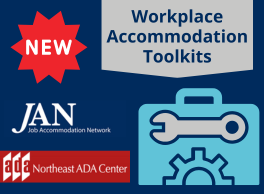


October 2025 marks the 80th Anniversary of National Disability Employment Awareness Month (NDEAM)!
NDEAM began in 1945 as a weeklong observance of the contributions of people with physical disabilities. In 1988, Congress designated the commemoration as NDEAM where the event expanded to acknowledge the importance of increasing opportunities for people with all kinds of disabilities in the workforce. After the Americans with Disabilities Act (ADA) was passed in 1990, the Great Lakes ADA Center was established along with other regional centers under the ADA National Network to provide information on the ADA, including the rights of workers with disabilities under the law.
This month, learn about the ADA employment rights of people with disabilities by visiting the ADA National Network’s Employment Resource Hub.

DOJ Halts Proposed ADA Regulations and Shares Plans to Review Existing
On September 11, the DOJ announced that it would withdraw 54 pending regulatory actions, 2 of which concern the ADA. These regulations include proposed requirements on accessible equipment/furniture as well as a rulemaking on public rights of way (e.g. sidewalks and on-street parking). Learn more about these two regulatory actions. In addition, DOJ announced in their regulatory agenda on September 23 that they plan to publish Notices of Proposed Rulemaking (NPRM) for regulations under ADA Titles II and III, including the newest regulations on web content and mobile applications.

Is Employment of People with Disabilities Declining?
The latest National Trends in Disability Employment (nTIDE) report shows that the employment of people with disabilities declined by a full percentage point last month, while the employment of people without disabilities remained unchanged. Learn more about monthly employment trends in the recent Kessler Foundation report.

Funding Cuts for Employment Barrier Research
Over the past year, a team of researchers at Cornell University has been studying the barriers that neurodivergent people face when seeking jobs. But in May, National Science Foundation funding for the project was terminated. Learn more about this study and research funding cuts.

$1 Million Loan to Expand Disability Services in Rural Illinois
U.S. Department of Agriculture's Rural Development announced a $1 million loan to enhance services for individuals with intellectual and developmental disabilities (IDD) in rural Illinois. The funding will support the expansion and renovation of Effingham County Opportunity Foundation's facility in Teutopolis which will offer job training, community integration training, and independent living skill training. Initiatives like these can support state compliance with the ADA community integration mandate and limit unnecessary institutionalization of people with disabilities.
Peoria County Gives $1.6 Million in Grants to Programs for Adults with Disabilities
The Peoria County Board for the Care and Treatment of People with Developmental Disabilities sent funds to local agencies helping people with disabilities with job placement and life skills. Initiatives like these can support state compliance with the ADA community integration mandate and limit unnecessary institutionalization of people with disabilities.

Accessibility Guides for Downtown Bloomington Businesses
The City of Bloomington has awarded a $15,000 grant for AccessAbleUSA, Inc. to work with up to 30 small independent businesses, conduct remote surveys and create Detailed Access Guides. These guides will provide accurate and practical information to help customers with diverse needs assess a venue’s accessibility. AccessAbleUSA’s methodology incorporates the ADA Accessibility Guidelines along with international best practices for accessibility. The surveys will consider physical access as well as sensory, neurological, and cognitive needs.
Governor Signs Bill to Reform Indiana’s Medicaid Program
Gov. Mike Braun signed into law House Enrolled Act (HEA) 1689 to help provide solutions for families of medically complex patients impacted by Medicaid waiver changes. The bill’s passage comes after a period of unsustainable growth in state Medicaid spending, driven in part by expanded access to home-and-community-based services during the pandemic. This law aims to support state compliance with the ADA community integration mandate and ensure people in need of community supports can access them.

Budget Cuts Threaten Disability Independent Living Services
The 2026 fiscal year budget bill passed on August 28th in the Michigan House, slashing funding for the state’s 15 Centers for Independent Living (CILs) from $19.7 million to $11 million beginning on October 1, 2025. CILs provide critical programs and resources for people with disabilities, caregivers, agencies and municipalities. The cuts threaten thousands of people who rely on CILs to live independently. Learn more about Centers for Independent Living and how they support the ADA community integration mandate.
Empowering Disabled Entrepreneurs in the Virtual Marketplace
This Michigan Economic Development Corporation (MEDC) podcast episode features Trove Market, a new digital platform designed to help disabled entrepreneurs connect with buyers and grow their businesses. Platform developer, Dave Meador, hopes the platform will help address high unemployment rates and lack of employment opportunities for people with disabilities. Under the ADA, workers with disabilities are entitled to equal employment opportunities.

Two Minnesota Cities Top List of Cities Most Welcoming to People with Disabilities
Minneapolis and St. Paul were ranked in the top five in a recent study of the 'Best and Worst Cities for People with Disabilities.' St. Paul finished with a fifth-place ranking, while Minneapolis took the top overall spot in large part due to the high scores for their healthcare. Learn more about the ADA requirements for healthcare.
Disabled Minnesotans Push for Equal Access to On-Demand Transportation
After years of offering few on-demand or short-notice transportation choices to people with disabilities, more transit and transportation companies are touting the kinds of quick-turn errand options that people without disabilities have long enjoyed. From self-driving vans that pick up and drop off folks in and around Grand Rapids to recent “micro” transit services enabling door-to-door trips in the Twin Cities’ southern suburbs, disabled residents may be getting more ride flexibility. Learn more about ADA and accessible ground transportation.

Disability Rights Advocates on Potential Impact of Medicaid Cuts
Ohio is estimated to lose 13% of its funding from federal Medicaid cuts over the next 10 years. This loss threatens services that assist in meeting the state’s ADA community integration mandate. Many of these services are often covered by Medicaid such as home health aides or transportation to and from medical appointments. Without Medicaid funding assistance, many people would be left with no choice but to rely on institutional care.
A ‘Library’ Lends Wheelchairs and Ramps to People with Disabilities
People with disabilities in Wayne County can borrow accessibility equipment for free directly from IncludeAbility lending library, a nonprofit organization that partners with local businesses and organizations to make their facilities more accessible. Available equipment includes walkers, electric lifts, portable ramps, reading machines, and wheelchairs for hiking, basketball and everyday use. This equipment can help entities provide access to a variety of programs and activities covered by the ADA.

Advocates Continue to Push for Online Voting for Disabled Wisconsinites
Disability advocates are continuing to push for Wisconsin’s disabled voters to be able to request, mark or return their ballots online. Advocates say online access would give disabled voters the opportunity to vote privately and independently which can be a challenge for voters with disabilities who attempt to vote in person. The Dane County Circuit Court judge plans to rule on a case involving a voter with muscular dystrophy and voter independence soon. Learn more about requirements for voting and polling places under the ADA.
Grants that Support Students with Disabilities Cancelled
The U.S. Department of Education recently terminated nearly $11 million for two grant programs that had been helping Wisconsin serve children with vision, hearing loss and others receiving special education services, according to the Wisconsin Department of Public Instruction. As a result, several initiatives funded by the grant will be eliminated including contracts to develop an online training program for new special education teachers, a social media campaign for teacher recruitment, and an online toolkit for educators about individual education plans. Learn how multiple laws, including the ADA, can protect against disability discrimination in educational settings.

New Workplace Accommodation Toolkits
The Job Accommodation Network’s (JAN) Workplace Accommodation Toolkit provides employers step-by-step guidance, templates, checklists, and training materials to confidently navigate the ADA accommodation process. Check out JAN’s toolkit.
Northeast ADA Center’s Welcoming Employees Toolkit provides information and resources about how (and why!) small businesses can successfully hire and retain employees with disabilities.
Check out Northeast ADA Center’s toolkit which includes expert guidance on following the ADA.
New Resource for Veterans with Disabilities
The Department’s Veterans’ Employment and Training Service and the Office of Disability Employment Policy developed a Veterans Accommodations Toolkit focusing on increasing employment rates and participation in apprenticeship programs by veterans with disabilities. Learn more about this toolkit including strategies to help improve workplace supports and ADA accommodations.

Peer Mentoring & Employment for People with Disabilities
A new study identified key features of peer mentoring programs that successfully help individuals with physical disabilities achieve their employment goals. The findings will guide the development of a training curriculum to better prepare peer mentors to support employment outcomes. Read more about the study.

Answer: It depends. A physical or mental condition that substantially limits a major life activity is considered a disability under the ADA. There is no automatic cut off for the length of time an impairment must last before it can be considered a disability. The Equal Employment Opportunity Commission (EEOC) has stated a medical condition does not need to be long-term, permanent, or severe to be substantially limiting. Also, if symptoms come and go, what matters is how limiting the symptoms are when they are active.
For example, if an individual has a back impairment that results in a 20-pound lifting restriction that lasts for several months, they could be substantially limited in the major life activity of lifting even though the impairment and limitation are not permanent.
Resource(s):
Learn more by visiting our ADA Frequently Asked Questions.

EEOC v. Piedmont Cheerwine Bottling Company (Cheerwine)
According to the suit, an employee took medication for her disability which resulted in a limp while she walked. The company required her to submit to a medical examination weeks earlier than other probationary employees because of her disability. Even though the employee met the physical requirements of the position, Cheerwine placed her on unpaid leave and told her to obtain a complete medical clearance before returning. The employee submitted a doctor’s note clearing her to work, but Cheerwine rejected the note and fired her.
EEOC v. Virginia International Terminals, LLC (VIT)
VIT will pay $20,000 to settle lawsuit. According to the suit, the employee worked as a hustler truck driver, moving shipping containers around an airport terminal at a max speed of 20 mph. The driver was hospitalized after a cardiac event and received an implantable cardioverter defibrillator. EEOC alleged that after his procedure, VIT refused to allow him back to work as a hustler driver, even though he received a medical release, and instead offered lower-paying work.
EEOC v. American Multi-Cinema (AMC)
According to the lawsuit, AMC forced an employee with cerebral palsy to quit after it deprived him of reasonable accommodations which would have enabled him to better perform his job and then greatly reduced his hours. EEOC alleged the theater refused to provide a ticket scanner with a strap and side button which would have been easier for him to use, and a printed list of the movies and their corresponding theaters in large font.
EEOC v. Sanmina Corporation (Sanmina)
Sanmina will pay $77,500 to settle the lawsuit. According to the suit, after allowing employees to work from home for two years, Sanmina required employees to return onsite. The employee requested a reasonable accommodation to continue working remotely. Although Sanmina told her she could continue to work from home pending any further consideration of her requested accommodation, the company fired her several months later without notice, because she continued to exercise her reasonable accommodation of working remotely due to her disabilities.
EEOC v. Tower Automotive Operations USA I, LLC
According to the suit, the employee, who had over 30 years’ experience in automotive manufacturing, joined the manufacturer’s apprenticeship program in 2018 as the only female apprentice, and performed successfully. After a layoff, the company allowed men to resume their apprenticeships. It recalled the female employee, but refused allow her to re-enter the apprenticeship program, denying her a higher wage and opportunities for overtime. Instead, the company allowed three younger men to enter the program in 2022 as new apprentices. The company reinstated her as an apprentice in 2025 but paid her a lower apprentice rate.
According to the suit, the employee had a seizure at work and called out sick for a handful of days. Fluent then instructed the employee to obtain a doctor’s note before she could return to work. The employee provided the note, which included a request for reasonable accommodation. Instead of discussing the request with the employee, the company immediately terminated her.
According to the lawsuit, following a suicide attempt resulting from mental health conditions, employee requested approximately four to six weeks of unpaid leave to receive outpatient medical treatment. The suit alleged that even though executives knew the employee asked for time off to seek treatment for mental health-related disabilities, the company denied her unpaid leave request and fired her.
EEOC v. National retailer Barnes & Noble College Booksellers, LLC
According to the suit, after receiving a diagnosis of postpartum depression from her physician, the employee contacted human resources to request unpaid leave beyond the 90-day maximum permitted under the company’s leave policy. Instead of working with the employee to find a reasonable accommodation, the company encouraged her to resign and fired her.
EEOC v. Digital Intelligence Systems, LLC (Dexian DISYS)
The EEOC charged that when a DISYS recruiter learned a candidate was “hard of hearing” and required an accommodation for the interview, all recruiting efforts ceased. The recruiter did not respond to further inquiries by the candidate, including a query about whether or not the candidate was being discriminated against because of his disability.
EEOC v. Bollinger Shipyards, LLC (Bollinger)
The EEOC charged that Bollinger placed a worker on involuntary indefinite unpaid leave from her position as a shipfitter after it learned of her prescription. Bollinger excluded the worker even though the worker had performed her role safely and competently. EEOC alleged that the employee, who was recovering from opioid dependency, used her medication lawfully under her physician’s supervision and was qualified to continue performing her job.
EEOC v. Walmart Inc. - Mount Pleasant, Wisconsin
According to the lawsuit, Walmart refused to accommodate an employee who required a job coach due to his intellectual disability and subjected him and a coworker to a hostile work environment based on their disabilities.
EEOC v. Yellowhouse Machinery Co. (Yellowhouse)
According to the suit, for almost three years, a receptionist who suffers from debilitating chronic migraines triggered by prolonged exposure to bright light was allowed to work under dimmed overhead lighting. But in 2024, the store manager abruptly replaced the existing lighting with bright LED bulbs. The receptionist submitted a doctor’s note to the manager, explaining her medical need for dimmer lighting. Yellowhouse refused to do anything other than move her desk a few feet — an ineffective measure which failed to alleviate her symptoms.
EEOC v. American Airlines, Inc. (American)
According to the lawsuit, American failed to provide a reasonable accommodation to an employee after she developed cortical blindness. The employee requested use of screen reader software to convert text and other information on computers into synthesized speech. Instead providing a reasonable accommodation, American kept her on unpaid involuntary leave for almost four years and then fired her after failing to facilitate her return to work.
EEOC v. Jewel Food Stores, Inc and American Drug Stores LLC (Jewel-Osco)
EEOC and Jewel-Osco entered into a voluntary agreement in which Jewel-Osco agreed to pay $1.95 million in monetary relief to a group of affected individuals and to provide other non-monetary relief such as disability training for management and policy revisions. The agreement resolves charges filed alleging that Jewel-Osco denied reasonable accommodations to a group of employees based on their various disabilities.
EEOC v. Talecris Plasma Resources
According to the lawsuit, a nurse who applied for position had her job offer revoked after she asked for an accommodation for her alcohol and substance use disorders. The nurse successfully completed a drug rehabilitation program eight months earlier and was participating in a treatment program with Colorado’s Peer Assistance Services, Inc. for health care professionals.
EEOC v. Coca-Cola Bottling Company United, Inc. (CCBCU)
According to the suit, the employee who worked as a delivery driver was diagnosed with renal disease requiring dialysis. After he asked for a change in his work schedule to accommodate his dialysis, CCBCU determined he could not work a different schedule as an accommodation and told the employee to apply and compete for other jobs in the company aligned with his medical restrictions. The employee identified and applied for a job with a schedule allowing him to continue dialysis while working full time. Even though he was qualified for the position, CCBCU refused to place him into the position, and terminated him.
EEOC v. Elon Property Management LLC (Elon Property)
Elon Property agreed to pay $200,000 to settle lawsuit. EEOC charged the company retaliated against a district manager for taking a medical leave of absence when it placed her on a performance improvement plan the day she returned from leave. The company also punished her for a decline in occupancy rates at her properties while she was on leave.

In September 2025, Disability Rights Advocates and Lathan & Watkins LLP filed a class action lawsuit on behalf of four Chicagoland residents with mobility disabilities against the City of Chicago, challenging its widespread and ongoing failure to make its sidewalks, curb ramps, and other public pedestrian rights of way accessible to people with mobility disabilities.

A federal judge has ordered Wisconsin to give back pay to disabled workers who were denied unemployment over the past decade. The case also found that a “blanket denial” of unemployment payments to Wisconsinite receiving Social Security disability payments violates the Americans with Disabilities Act and the Rehabilitation Act.

DOJ v. Uber Technologies, Inc. (Uber)
DOJ filed a lawsuit against Uber for discriminating against passengers with disabilities, including blind individuals who use service animals and those who use mobility devices including stowable wheelchairs, by routinely refusing to serve these individuals, imposing impermissible charges, and refusing to reasonably modify Uber’s policies to avoid discrimination.
DOJ v. Sunrise Hospital & Medical Center, LLC (Sunrise)
The United States Attorney’s Office for the District of Nevada secured an agreement with Sunrise to ensure that patients and their companions who are deaf have appropriate auxiliary aids and services, including qualified in-person or video remote interpreting services.

